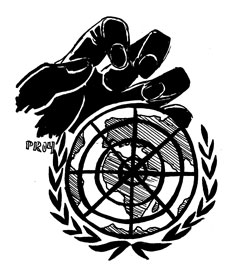Column: U.S. out of the U.N.

Tim Eggerding
January 28, 2005
By maintaining no moral absolute in granting legitimacy to non-democratic regimes, the United Nations serves as a primary force against progress on the issues it so nobly seeks to address. A “union of nations as equals” doesn’t exist, and the real United Nations does the world more harm than good. For the sake of human dignity and freedom, the United Nations must leave the United States, and the United States must leave the United Nations.
This sounds harsh: at least the United Nations was a good idea, right?
Let’s put aside the fact that U.N. Secretary-General Kofi Annan is implicated in the Iraq Oil-for-Food scandal, in which many U.N. and European bureaucrats profited at the expense of the Iraqi people. Let’s also ignore the United Nations’ repeated impotence in the face of human catastrophe: Rwanda, Srebrenica, Darfur – to name but a few. Defenders of the United Nations might argue, how can we not support an organizations whose charter calls for “faith in fundamental human rights, in the dignity of the human person, and in the equal rights of men and women?”
Despite this na‹ve idealism, the United Nations is fundamentally flawed, and structurally anti-democratic; in fact, by its nature it prevents progress on each of the goals listed in its charter.
The U.N. General Assembly is comprised of representatives from the executive branches of power of every member nation (notably absent are representatives of legislative branches of government). The anti-democratic nature of the United Nations is rooted in a very important shortcoming: The United Nations makes no distinction between countries whose executive branches use their power to enact the will of the people, and countries whose executive branches use their power to maintain control of their people.
Get The Daily Illini in your inbox!
Given the majority of member states are represented undemocratically in the United Nations, we wind up with an organization whose members’ interests conflict directly with those they govern. To quote author Carrol Andrew Morse, “looking to the U.N. to protect individuals who are not government executives from abuses of government power makes as much sense as looking to the International Tobacco Growers’ Association to protect individuals from the dangers of smoking.” This behavior as that of a political lobby is confirmed in U.N. policy regarding Iraq: in 1990, Saddam Hussein violated the executive authority of Kuwait, and the United Nations came together to restore Kuwaiti independence. Similarly, in 2003, when the United States violated Saddam’s executive authority, the United Nations was strongly opposed to such violation of national sovereignty; the disgusting moral equivalence of this position was simply representative of the United Nations’ function as a body attempting to preserve executive power.
The Oil-for-Food program, begun wishfully to ease the hardships caused by sanctions, was doomed from the start for the simple reason that it was a United Nations program: Saddam Hussein merely operated within the framework the United Nations provided him, maintaining his control of power with no regard for the welfare of the people he supposedly represented. The scoundrels who profited off this debacle were opportunists acting on their own accord, yet the United Nations undeniably provided the backdrop for such savage exploitation of the Iraqi people to take place.
When U.N. peacekeepers explain that they aren’t peacemakers, and stand idly by literally watching the massacre of thousands of men, women, and children, they can hardly be said to be upholding the ideals for human dignity and equality set forth in the charter. And why should they, when the majority of member nations of the United Nations have no interest in them doing so?
Providing a democratic forum for non-democratically elected representatives is meaningless and counter-productive. This is not complex theory, but simply an extrapolation of the basic human instinct towards self-preservation. And this summarizes the United Nations: a tool by which tyrants of the world can hope to strengthen their hold on power under the falsely legitimizing veil of a democratic union of nations.
David Johnson is a senior in business. His column runs Fridays. He can be reached at [email protected].






